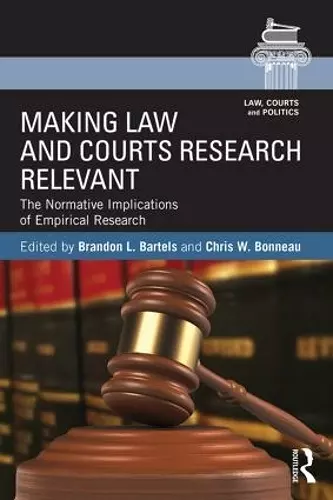Making Law and Courts Research Relevant
The Normative Implications of Empirical Research
Brandon L Bartels editor Chris W Bonneau editor
Format:Paperback
Publisher:Taylor & Francis Ltd
Published:2nd Oct '14
Currently unavailable, and unfortunately no date known when it will be back
This paperback is available in another edition too:
- Hardback£145.00was £145.00(9781138021907)

One of the more enduring topics of concern for empirically-oriented scholars of law and courts—and political scientists more generally—is how research can be more directly relevant to broader audiences outside of academia. A significant part of this issue goes back to a seeming disconnect between empirical and normative scholars of law and courts that has increased in recent years.
Brandon L. Bartels and Chris W. Bonneau argue that being attuned to the normative implications of one’s work enhances the quality of empirical work, not to mention makes it substantially more interesting to both academics and non-academic practitioners. Their book’s mission is to examine how the normative implications of empirical work in law and courts can be more visible and relevant to audiences beyond academia. Written by scholars of political science, law, and sociology, the chapters in the volume offer ideas on a methodology for communicating normative implications in a balanced, nuanced, and modest manner. The contributors argue that if empirical work is strongly suggestive of certain policy or institutional changes, scholars should make those implications known so that information can be diffused. The volume consists of four sections that respectively address the general enterprise of developing normative implications of empirical research, law and decisionmaking, judicial selection, and courts in the broader political and societal context.
This volume represents the start of a conversation on the topic of how the normative implications of empirical research in law and courts can be made more visible. This book will primarily interest scholars of law and courts, as well as students of judicial politics. Other subfields of political science engaging in empirical research will also find the suggestions made in the book relevant.
"The increasingly challenging public environment for social scientific research often compels scholars to draw policy and normative conclusions from their work. Doing so thoughtfully and carefully, however, is its own challenge. Bartels and Bonneau have assembled a veritable "who's who" in political science, law, and other fields to tackle this challenge head-on. The series of essays that make up this valuable collection offer both explicit advice and valuable examples for engaging with broader audiences. It should be required reading for scholars (new and old) who are grappling with the prescriptive aspects of their empirical work, and how best to connect with those outside the academy. "—Christopher Zorn, Pennsylvania State University
"Through systematic research, scholars have amassed a great deal of insight into the operations, decision-making, and consequences of the judicial system. Ironically, there is relatively little conversation between the researchers, who study the courts, and the policy makers, who manage them. Why? Bartels and Bonneau have assembled an impressive cast of political scientists and legal scholars to address this question --- and to offer some possible solutions. Both academics and governmental officials will benefit from reading this highly original and important book."—Kevin McGuire, University of North Carolina at Chapel Hill
"Crisis can be opportunity. Recent efforts to cut funding for social science research provides the stimulus for this fresh and important examination of the growing gap between the supposedly value-neutral research on law and courts produced by the social sciences and the deeply normative and prescriptive analysis of the legal academy. Each badly needs to learn from the other. This volume demonstrates this divide is broad and deep – but it also provides more than a few steps on the long and much needed road to rigor and relevance."—Gordon Silverstein, Assistant Dean, Yale Law School
ISBN: 9781138021921
Dimensions: unknown
Weight: 362g
242 pages